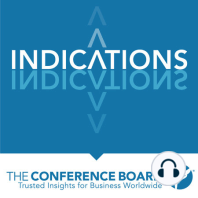28 min listen
US Labor Shortages: Company Solutions
FromIndications
ratings:
Length:
20 minutes
Released:
Mar 11, 2020
Format:
Podcast episode
Description
This is the last episode in a 3 part series based on The Conference Board report “US Labor Shortages: Challenges and Solutions.” In this third episode, Elizabeth Crofoot, Senior Economist at The Conference Board, and Frank Steemers, Associate Economist, discuss company solutions to the labor shortage problem. Based on our Labor Shortages Solutions Survey, we explore solutions to recruitment and retention challenges used by organizations most affected by labor shortages. Many of these organizations are those primarily hiring blue-collar and manual services workers. While raising wages and salaries is the top remedy, employers are taking further steps to attract and retain talent, including: making tactical improvements to their recruiting efforts, making jobs more attractive, improving training and talent pipelines, and widening the talent pool by expanding target recruitment groups and relaxing hiring criteria. Automation can also play a role in alleviating labor shortages, but U.S. productivity growth—a good proxy for automation’s impact—has significantly slowed down this decade. Despite progress in eliminating easily automated tasks, especially in office and administrative support occupations, additional automation is needed to offset growing labor shortages.
Released:
Mar 11, 2020
Format:
Podcast episode
Titles in the series (99)
C-Suite Challenge™ 2020: The View of Risks and Opportunities in 2020: Co-authors Ilaria Maselli, Senior Economist for Europe at the Conference Board and Chuck Mitchell Executive Director, Knowledge Content & Quality at the Conference Board, discuss the findings of our latest C-Suite Challenge report. This report is... by Indications
